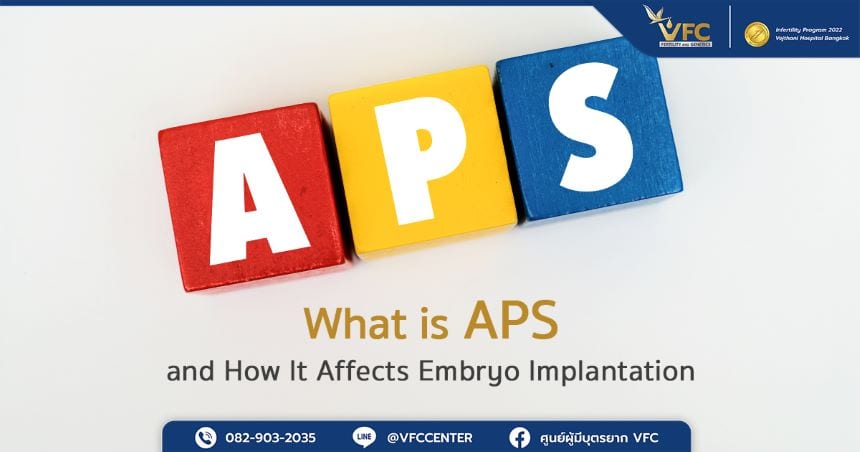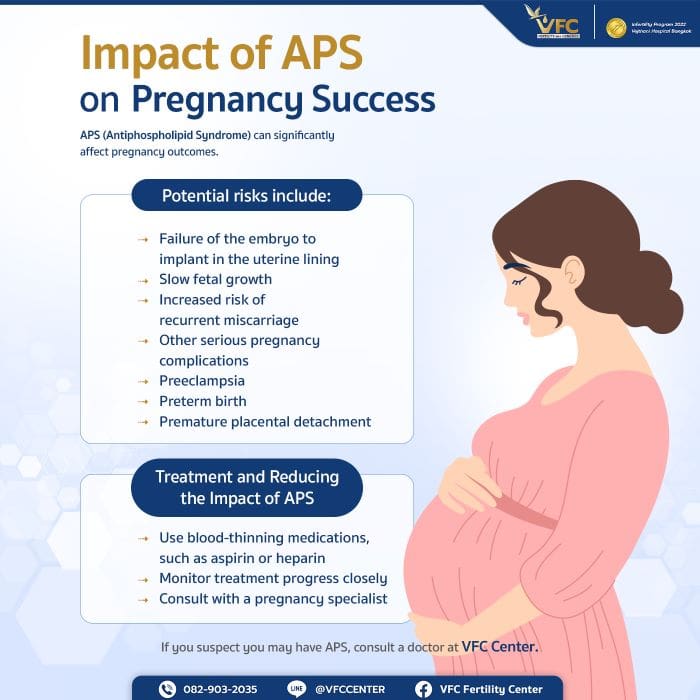
Couples trying to conceive and undergoing fertility treatments, whether IVF (In Vitro Fertilization) or ICSI (Intracytoplasmic Sperm Injection), but still unable to achieve pregnancy despite repeated egg stimulation, retrieval, fertilization, and embryo transfer, should understand what is APS (Antiphospholipid Syndrome), also known as “antiphospholipid syndrome.” This condition is a significant factor that can affect embryo implantation and increase the risk of pregnancy complications. Understanding APS in depth can help couples make informed decisions about appropriate treatments to improve their chances of a successful pregnancy.
What is antiphospholipid syndrome?
APS (Antiphospholipid Syndrome) is an autoimmune disorder in which the immune system produces antibodies that attack phospholipid proteins in the body. This can lead to blood clots and may impair blood flow to the uterus, preventing successful embryo implantation or increasing the risk of threatened miscarriage.
Diagnosis of APS
Diagnosing APS is crucial for doctors to plan appropriate treatment. Diagnosis is based on clinical symptoms and blood tests, especially for Antiphospholipid Antibodies, which include:
- Lupus Anticoagulant (LA)
- Anticardiolipin Antibody (aCL)
- Anti-β2-glycoprotein I Antibody (anti-β2GPI)
High levels of these antibodies may indicate APS. Blood tests not only confirm the diagnosis but also help doctors assess the severity and the risk of complications that could affect embryo implantation or pregnancy outcomes. Accurate diagnosis allows for targeted treatment, improving the chances of a successful pregnancy for couples undergoing IVF in Thailand or other fertility treatments.

How Does APS Affect Pregnancy?
APS significantly impacts pregnancy, especially for couples undergoing IVF in Thailand due to infertility. It is a major cause of pregnancy complications throughout gestation. The main potential effects include:
Impact on Embryo Implantation
Blood clots in the vessels can limit blood flow to the uterus, making the uterine lining less receptive for embryo implantation. This is a key reason why some couples experience repeated IVF failures. Understanding APS meaning helps clarify why implantation may not succeed.
Fetal Growth Restriction
Impaired blood flow to the placenta due to clots can reduce oxygen and nutrient delivery to the fetus, causing intrauterine growth restriction (IUGR). Babies may be born with lower-than-normal birth weight.
Risk of Recurrent Miscarriage
PS is a significant cause of recurrent miscarriage, defined as two or more pregnancy losses, often in the first or second trimester. Blood clots in placental vessels can disrupt placental function, leading to repeated pregnancy loss.
Increased Risk of Pregnancy Complications
In addition to affecting implantation and fetal growth, APS raises the risk of serious complications, including:
- Preeclampsia : severe high blood pressure with protein in urine, dangerous for both mother and baby
- Preterm Labor : early delivery due to abnormal placental function from clots
- Placental Abruption : premature separation of the placenta from the uterine wall, causing heavy bleeding and life-threatening risks

How to Treat APS to Reduce Its Impact on Pregnancy
Use Blood-Thinning Medications
Doctors may recommend blood-thinning medications, such as aspirin or heparin, to reduce the formation of blood clots. These medications help prevent blockages in the blood vessels supplying the uterus, improving the chances of successful implantation and a healthy pregnancy.
Close Monitoring of Treatment
Regular monitoring and consultation with a fertility specialist are essential, as APS treatment requires careful management. This helps reduce the risk of miscarriage and other pregnancy complications.
Consult a Pregnancy Specialist
Consulting an obstetrician or fertility specialist ensures that APS treatment is tailored to your needs, increasing the likelihood of a successful pregnancy.
For couples seeking to improve their chances of conception, screening for APS is an important step not to overlook. If you suspect you may have APS, consulting a doctor at an IVF clinic in Thailand, such as VFC Center (V Fertility Center), can help you understand your condition, plan your pregnancy effectively, and receive personalized guidance and care.
Article by Dr. Worawat Siripoon
For inquiries or appointments:
VFC Center
Hotline: 082-903-2035
LINE Official: @vfccenter

OBSTETRICS AND GYNAECOLOGY-REPRODUCTIVE MEDICINE





No Comments
Sorry, the comment form is closed at this time.